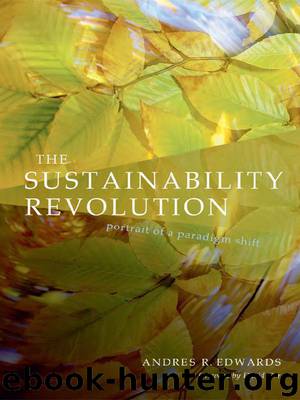The Sustainability Revolution by Edwards Andres R

Author:Edwards, Andres R. [Edwards, Andres R.]
Language: eng
Format: epub
Publisher: New Society Publishers
Published: 2005-05-31T16:00:00+00:00
One of the main points of the Asilomar Declaration is the need to preserve and promote the farming lifestyle and rural communities. The threat to this fundamental way of life from large corporations purchasing family farms is one of the most visible signs of the influence of corporate America on the farming industry. Since small farmers cannot compete with large agribusiness farms, the declaration states: “Undue rewards to concentrated interests should be replaced with fair returns to farmers who sustainably provide food and fiber.”
The Asilomar Declaration includes sustainability education for farmers and the public. Training and apprenticeship programs would expand organic farming, thereby reducing the cost of organic produce. Educating the public about organic farming would encourage consumers to pay the “true costs” of agricultural products, since many current government subsidies conceal the actual costs of growing and transporting food.
Understanding of the true costs of food products requires a systems perspective that examines the numerous steps in preparation, production, packing, shipping and final delivery. In the case of vegetables, for example, the true costs include the farmer’s cost of preparing the soil, controlling pests, irrigating and harvesting; the cost of the energy required to package the product; and the cost of the energy and air pollution involved in transporting the product to the local market, where it is kept until it is purchased.
In effect, international trade agreements and the global transportation network the true ecological, economic and social costs.
Developed nations such as the United States import a wide range of off-season food items, including apples from Chile and mussels from New Zealand, that are transported thousands of miles by air and then trucked nationwide to local supermarkets. These items are resource-intensive goods that also disrupt local economies by tying them to the price fluctuations of international markets. In effect, international trade agreements and the global transportation network mask the true ecological, economic and social costs.
Two innovative sustainable agriculture programs are Protected Harvest and the Code of Sustainable Winegrowing Practices. As an independent certifying organization, Protected Harvest was established in 2001 by the collaboration of the World Wildlife Fund, the Wisconsin Potato and Vegetable Growers Association and the University of Wisconsin with a mission of “advancing and certifying the use of environmentally and economically sustainable agriculture practices through the development of stringent, transparent and quantifiable standards, incentive-based eco-labeling and public education.” 22
The Protected Harvest standards pertain to specific environmental conditions of each crop and bioregion and focus on production (including pest, weed and disease management and soil and water quality); toxicity (staying below a total number of “toxicity units” per acre and prohibiting the most highly toxic pesticides); and chain of custody (auditing the crop from the field to the retail stores). Protected Harvest’s certification program has been successfully implemented on 10,000 acres of Wisconsin’s potatoes, with potatoes carrying the seal in supermarkets in the Midwest and on the East Coast. Protected Harvest aims to develop standards for 20 new crops in the coming years. 23
The Code of Sustainable Winegrowing Practices
Download
This site does not store any files on its server. We only index and link to content provided by other sites. Please contact the content providers to delete copyright contents if any and email us, we'll remove relevant links or contents immediately.
| Arms Control | Diplomacy |
| Security | Trades & Tariffs |
| Treaties | African |
| Asian | Australian & Oceanian |
| Canadian | Caribbean & Latin American |
| European | Middle Eastern |
| Russian & Former Soviet Union |
The Secret History by Donna Tartt(19002)
The Social Justice Warrior Handbook by Lisa De Pasquale(12177)
Thirteen Reasons Why by Jay Asher(8874)
This Is How You Lose Her by Junot Diaz(6857)
Weapons of Math Destruction by Cathy O'Neil(6249)
Zero to One by Peter Thiel(5767)
Beartown by Fredrik Backman(5717)
The Myth of the Strong Leader by Archie Brown(5482)
The Fire Next Time by James Baldwin(5409)
How Democracies Die by Steven Levitsky & Daniel Ziblatt(5200)
Promise Me, Dad by Joe Biden(5130)
Stone's Rules by Roger Stone(5065)
A Higher Loyalty: Truth, Lies, and Leadership by James Comey(4937)
100 Deadly Skills by Clint Emerson(4900)
Rise and Kill First by Ronen Bergman(4761)
Secrecy World by Jake Bernstein(4727)
The David Icke Guide to the Global Conspiracy (and how to end it) by David Icke(4685)
The Farm by Tom Rob Smith(4489)
The Doomsday Machine by Daniel Ellsberg(4474)
